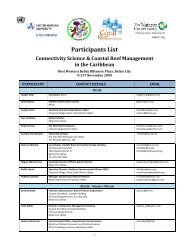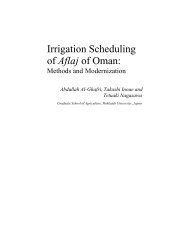The Global Water Crisis: Addressing an Urgent Security - Unu-inweh ...
The Global Water Crisis: Addressing an Urgent Security - Unu-inweh ...
The Global Water Crisis: Addressing an Urgent Security - Unu-inweh ...
Create successful ePaper yourself
Turn your PDF publications into a flip-book with our unique Google optimized e-Paper software.
In m<strong>an</strong>y urb<strong>an</strong> <strong>an</strong>d semi-urb<strong>an</strong> areas, treated or partially treated wastewater is used for irrigation. <strong>The</strong> UN World <strong>Water</strong><br />
Development Report 2003 estimates that approximately 10% of total irrigated l<strong>an</strong>d in 50 countries is irrigated with raw or<br />
partially diluted wastewater (UNESCO, 2003). Untreated wastewater contains pathogens, m<strong>an</strong>y of which c<strong>an</strong> survive in the<br />
environment, on crops <strong>an</strong>d soil, <strong>an</strong>d enter the food chain posing health risks to farmers <strong>an</strong>d their families <strong>an</strong>d consumers<br />
in nearby communities (see also Box 2 on Contaminated Crops in India). But wastewater also contains nutrients that are<br />
beneficial for crop production, reduces the requirement for adding chemicals <strong>an</strong>d fertilizers, <strong>an</strong>d contributes to water <strong>an</strong>d<br />
nutrient conservation. While it is true that the use of wastewater for irrigation has its adv<strong>an</strong>tages in terms of providing<br />
a low-cost source of water for food production <strong>an</strong>d for use in urb<strong>an</strong> <strong>an</strong>d peri-urb<strong>an</strong> areas in water-scarce regions, it is<br />
import<strong>an</strong>t to ensure that the costs of the health risks do not outweigh the benefits.<br />
<strong>Water</strong>-borne or water-related diseases such as diarrhea, which is widely prevalent, c<strong>an</strong> cause long-term damage to<br />
households <strong>an</strong>d the local economy. Individuals suffering from these illnesses are unable to work, study or provide for<br />
their dependents. Illness in the household also increases the work burden of caretakers, particularly women. Chronic or<br />
long-term water-related diseases are aggravated by poverty, <strong>an</strong>d in turn cause heavy economic <strong>an</strong>d welfare losses to the<br />
individual <strong>an</strong>d the household. At <strong>an</strong> aggregated level, particularly in developing regions or in countries that have limited<br />
or inadequate health care provisions, the local or national economy could be adversely affected by the loss of productive<br />
m<strong>an</strong>power <strong>an</strong>d public health costs. <strong>The</strong> Economics of S<strong>an</strong>itation Initiative 2 of the <strong>Water</strong> <strong>an</strong>d S<strong>an</strong>itation Programme of<br />
the World B<strong>an</strong>k estimates that the <strong>an</strong>nual economic losses from inadequate s<strong>an</strong>itation amount to between 1%-2.5% of<br />
GDP, with the majority of these costs coming from premature deaths, including in children under the age of five (<strong>Water</strong><br />
<strong>an</strong>d S<strong>an</strong>itation Programme, 2012).<br />
Conclusion<br />
<strong>The</strong> implications of inadequate water security, whether in terms of access, qu<strong>an</strong>tity or quality, are of great concern. Cle<strong>an</strong><br />
<strong>an</strong>d safe water is the keystone to healthy ecosystems <strong>an</strong>d healthy communities as prolonged exposure to pathogens <strong>an</strong>d<br />
toxic elements will negatively affect hum<strong>an</strong> populations <strong>an</strong>d ecosystem biota. An import<strong>an</strong>t step towards improving <strong>an</strong>d<br />
safeguarding public <strong>an</strong>d ecosystem health would be to include <strong>an</strong>d monitor health-based targets, for both hum<strong>an</strong>s <strong>an</strong>d<br />
ecosystems, along with economic targets in political <strong>an</strong>d government agendas. Government leaders <strong>an</strong>d fin<strong>an</strong>ce ministers<br />
need to underst<strong>an</strong>d the relationship between cle<strong>an</strong> <strong>an</strong>d safe water, improved health <strong>an</strong>d GDP. Political will combined<br />
with behaviour ch<strong>an</strong>ge of users <strong>an</strong>d consumers <strong>an</strong>d a ch<strong>an</strong>ge in attitude <strong>an</strong>d mindset of decision-makers is necessary to<br />
ensure that national priorities for water use <strong>an</strong>d allocation take into account public <strong>an</strong>d ecosystem health.<br />
2 <strong>The</strong> Economics of S<strong>an</strong>itation Initiative studies conduct qu<strong>an</strong>titative <strong>an</strong>d qualitative assessments of the impacts of poor s<strong>an</strong>itation on health, water,<br />
tourism, <strong>an</strong>d other welfare impacts. <strong>The</strong> impacts stem from well-established links between: s<strong>an</strong>itation <strong>an</strong>d disease incidence; water pollution, which<br />
also affects the productivity of water resources by way of lower fisheries output; productivity in work <strong>an</strong>d school; <strong>an</strong>d a country’s attractiveness as<br />
a tourist destination. Health <strong>an</strong>d water resources contributed most to the overall economic losses estimated in the study. Poor s<strong>an</strong>itation, including<br />
hygiene, caused at least 180 million disease episodes <strong>an</strong>d 100,000 premature deaths <strong>an</strong>nually. <strong>The</strong> resulting economic impact totalled more th<strong>an</strong> US<br />
$4.8 billion per year (<strong>Water</strong> <strong>an</strong>d S<strong>an</strong>itation Programme, 2012).<br />
82 <strong>The</strong> <strong>Global</strong> <strong>Water</strong> <strong>Crisis</strong>: <strong>Addressing</strong> <strong>an</strong> <strong>Urgent</strong> <strong>Security</strong> Issue




